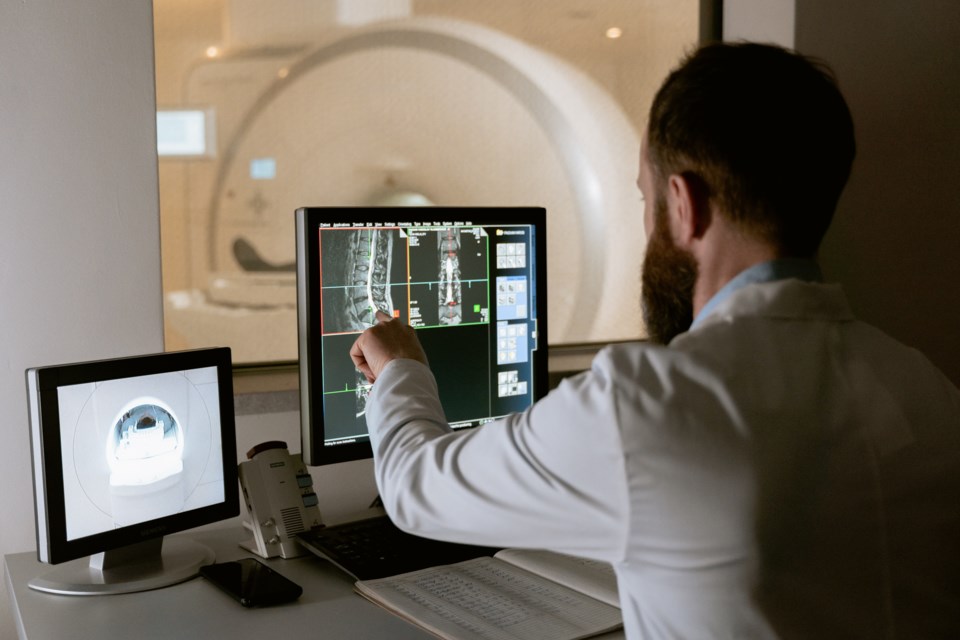There are many reasons why people have imaging scans done. That said, what shows up in the results don’t always match up to the patients needs and that’s why it’s important to listen to, and treat them, individually, said Rob Gordon, physiotherapist and owner of Lake Country Physiotherapy in Orillia.
“Imaging is thought to be the gold standard,” Gordon said, “and we have patients that say ‘I’m finally getting an MRI so I’ll finally get the answer’ and I tell them, actually, it often clouds the picture as our imaging technology is so sophisticated it is going to show every subtle change, many of which are not clinically relevant.”
Imaging is not always necessary before receiving physiotherapy treatment
Gordon explains that if someone has a history of accident trauma he may want imaging done before treatment. However, if a patient has no red-flags once an assessment is complete, he’ll begin treatment without needing an image at all.
In fact, the belief that an image is needed to quantify someone’s pain and give an exact diagnosis, can often leave people in pain unnecessarily longer than they have to be. A good example is a patient that Gordon had last year at the height of the pandemic where doctor, and surgery, wait-times were lengthy.
The elderly patient had a knee replacement on one knee and his pain indicated he may need one on the other. Between the wait times and the rehabbing, it may have been over a year of pain and declining mobility. Instead, Gordon assessed the entire picture and determined what was both necessary and the best course of action.
Turned out the “sore” knee moved better and further than the one that had been replaced. After applying treatment Gordon got him started on strengthening exercises. The patient was active in this plan of recovery and today his knee is doing great despite not having surgery.
“That’s what I mean by treat the (wo)man not the scan,” he said. “The scan is going to say, he’s 93, his other knee has been replaced and based on the way he moves and looked, he’s going to have severe osteoarthritis in that knee, but if you can settle it down, why would you put him through surgery that?”
Imaging is an invaluable tool but it’s not the whole picture
Gordon is in no way implying that imaging is unnecessary, in fact it’s an invaluable tool, he said, but people have to understand it can muddy the waters of recovery and it’s just one piece of the diagnosis and recovery.
A good example of this, Gordon explains, is someone who has had a scan before seeing him. “If they’ve had imaging before they get to us they may say the x-ray shows arthritis, and that’s why I have a sore knee.” While that may be the cause, what people may not know is that everyone over age 40 will have some level of arthritis in their knees, but not everyone who’s over 40 will have sore knees. This means x-rays don’t always diagnose the source of the pain.
“If you’re over 40, and we do an x-ray on your knees, I’m going to expect to see some arthritic changes and it can help if the person’s aware of that before they get their results,” he said.
Imaging education to avoid catastrophizing results
Gordon can’t stress enough the importance of educating yourself and ensuring your health care provider properly educates you on what your image findings mean, especially when it comes to what’s typical versus not. This will help stave off the “life sentence of pain” mentality, and catastrophizing that many people have when they receive image results with less than thorough explanations.
Despite some conditions, like arthritis, being irreversible, Gordon said that receiving individualized treatment, while it may not change the results of the next scan, will help people feel better.
“It will change their pain, their function and mobility – everything. And what’s going to happen is, they’ll no longer be in pain. They can move and resume activities. If that happens then who cares what your scan looks like.”
Lake Country Physiotherapy treats a variety of conditions and their clinic is open. If you’d like to book an appointment or have any questions, contact them at 705-327-7876 or email [email protected] to sign up for their newsletter.
